The Committee to Protect Journalists (CPJ) has joined 41 other human rights, free expression, and technology organizations in a letter to Zambian President Edgar Lungu, calling on him to ensure that the internet and digital communications remain uninterrupted throughout Zambia’s August 12 general election period.
In the letter, dated August 5, members of the #KeepItOn coalition against internet shutdowns said that in the lead-up to the elections, authorities had already introduced a number of laws, including the Cybersecurity and Cyber Crimes Act, 2021, the Data Protection Act, 2021, and the Electronic Communications and Transactions Act, 2021, that could enhance the government’s control of Zambia’s online civic space.
Among the letter’s recommendations, it urged Lungu to ensure “full internet access nationwide and refrain from arbitrarily blocking access to social media platforms such as Twitter, WhatsApp, Telegram, and Facebook, and websites of media outlets throughout the election period and thereafter”.
The letter notes that following the 2016 general elections, local media outlets reported at least two days of internet shutdowns and slowdowns in parts of Zambia.
The letter noted that internet shutdowns contravene international human rights laws and standards and that the Government of Zambia has ratified regional and international frameworks such as the legally binding International Covenant on Civil and Political Rights (ICCPR) and the African Charter on Human and People’s Rights, which provide for the protection and promotion of the rights of freedom of opinion and expression, assembly, and access to information, both offline and online.
The African Commission on Human and Peoples’ Rights (ACHPR) Resolution from 2016 recognizes the “importance of the internet in advancing human and people’s rights in Africa, particularly the right to freedom of information and expression.”
According to the letter, the ACHPR/Res. 362 (LIX) 2016 also condemns the “emerging practice of State Parties interrupting or limiting access to telecommunication services such as the internet, social media, and messaging services.”
“Additionally, U.N. experts and high-level officials —including the U.N. Secretary-General — formally affirm that, “blanket Internet shutdowns and generic blocking and filtering of services are considered by United Nations human rights mechanisms to be in violation of international human rights law,” the letter added.
GIK/APA


